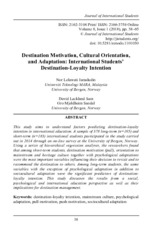Destination Motivation, Cultural Orientation, and Adaptation: International Students’ Destination-Loyalty Intention
Peer reviewed, Journal article
Published version

Åpne
Permanent lenke
https://hdl.handle.net/1956/20653Utgivelsesdato
2018Metadata
Vis full innførselSamlinger
Originalversjon
https://doi.org/10.5281/zenodo.1101030Sammendrag
This study aims to understand factors predicting destination-loyalty intention in international education. A sample of 378 long-term (n=195) and short-term (n=183) international students participated in the study carried out in 2014 through an on-line survey at the University of Bergen, Norway. Using a series of hierarchical regression analyses, the researchers found that among short-term students, destination motivation (pull), orientation to mainstream and heritage culture together with psychological adaptations were the most important variables influencing their decision to revisit and to recommend the destination to others. Among long-term students, the same variables with the exception of psychological adaptation in addition to sociocultural adaptation were the significant predictors of destinationloyalty intention. This study discusses the results from a social, psychological and international education perspective as well as their implications for destination management.
